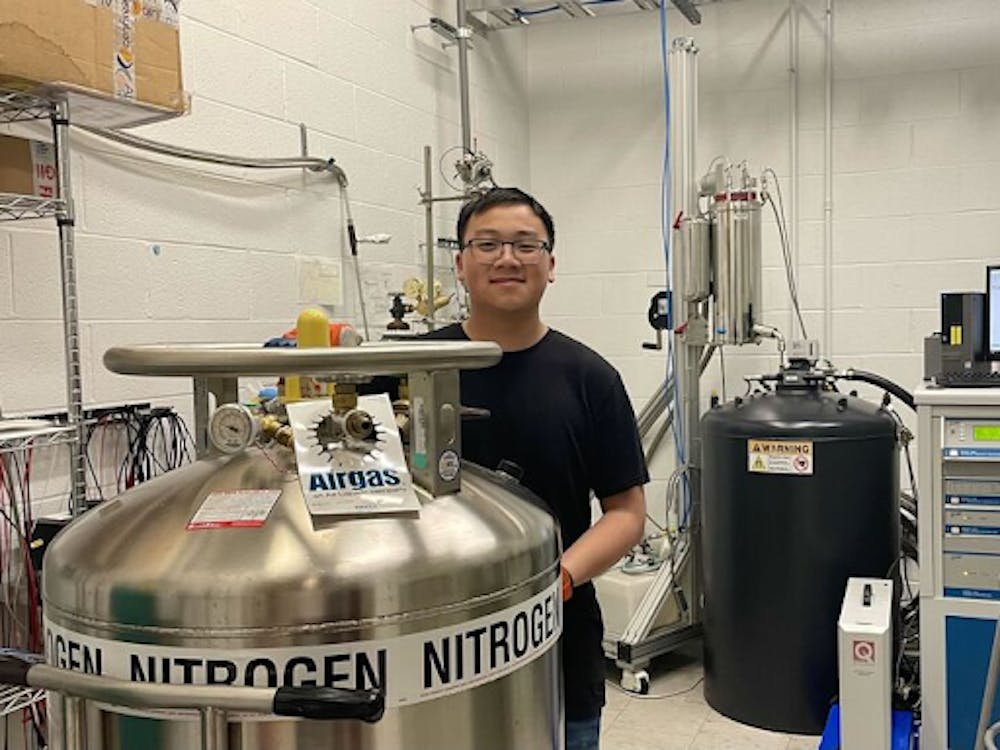Jason Zhang is a senior completing a BS/MSE in Chemical Biomolecular Engineering. In an interview with The News-Letter, Zhang discussed his research in chemistry and physics, where he grows gemstones in his lab, as well as his participation in the Mentoring Assistance Peer Program (MAPP).
The News-Letter: Can you talk about your research?
Jason (Xin) Zhang: When I joined freshman year, I was pretty clueless about what I wanted to do with my life, but with the culture of this institution, I started realizing that every other person that I knew was joining a lab. I was like “Huh! I am not that exposed to research, but this sounds pretty cool.” I was looking for labs I would like to do research in, and I took a general chemistry course with Professor Tyrel McQueen, who does quantum material research very broadly. As a freshman, I thought “I don't know what any of this is, but it looks pretty badass, so I'm going to ask if I can do something with it.” I joined him in my freshman spring and I've been in the lab since.
N-L: We’ve heard that you’ve been able to grow gems as part of your lab work. Could you talk more about this?
JZ: McQueen’s lab helps run a national user facility called PARADIM [Platform for the Accelerated Realization, Analysis, and Discovery of Interface Materials], and we have equipment that can grow gemstones, the example being rubies and sapphires. PARADIM has the capability to grow crystals that would otherwise not exist in nature, and it is primarily utilized for research purposes. More broadly, the purpose of PARADIM is to help accelerate the discovery of new materials and interfaces, an example being materials that have the necessary properties to forge the next generation of electronic devices.
To answer your question directly, yes, I have made them before! My birthstone is a ruby, so you may see me carrying some around by the time I graduate as a parting gift!
N-L: What have you been doing for the last three and a half years?
JZ: My first two years, I did string experiments. I was trying to find materials that hosted skyrmion electrons, which are very small and stable. For the first two years, nothing worked. We had a new professor, Brandon Bukowski, come into the chemical engineering department, and his specialty is in computation. [I thought that] maybe I could exploit computation to help me figure out what I'm doing wrong. I work with two professors now, and I've been trying to do computational modeling to help me make more informed decisions and understand where I'm going wrong. I think I'm making progress. Did I actually find the skyrmion that I wanted to? The answer is no, but it is very promising.
N-L: For your doctoral degree, are you going to continue working on this project or are you going to work on something else within quantum material?
JZ: As for where this specific project is going to go, that depends on what my future PI [principal investigator] thinks about it. As for what I'm doing in the future, I just committed to Princeton for Chemistry and Material Science. That's where I will be [working toward my doctoral degree], and very likely, it will be under the same field.
N-L: What are some of your aspirations for your future as a researcher?
JZ: I don't know what I would like to do after my [doctoral degree]. I’m thinking of industry or academia, but I don't know. I have five years to figure that out, so I have plenty of time, but the overall goal is to do some type of research. I would like to make a meaningful contribution to society through work that I enjoy. That's my broad goal.
N-L: Can you talk to me a little bit about your life outside of Chemical and Biomolecular Engineering? What are some of your other passions?
JZ: I'm a first-generation student. From freshman year to now, I have been involved with an organization called MAPP under the Office of Multicultural Affairs. The purpose is to help underrepresented, underserved incoming students that may not have knowledge of what it is to be a college student. In my case, neither of my parents finished high school, so I started as a mentee for that program. It helped me a lot, so I decided to pay it forward, and I’m now a mentor for MAPP.
In my free time, I did breakdancing for the first three years. I did take a hiatus this year. Things did get a little busy for me. I'm a horrible break dancer, but that doesn't stop me from trying to be at least somewhat okay at it. I’ve been doing Taekwondo since I was 10. I did it for a bit freshman year and then I also had to take a hiatus from that after COVID-19, but it's something that I would like to pick up once I start graduate school. I love video games, too.
N-L: Do you have anything else that you want to share or lessons you’ve learned?
JZ: My first semester of Hopkins was the most difficult semester of my life. I made it through, and I enjoyed the opportunities that the institution has been able to give me. I did take advantage of it, and I'm very grateful for that. That doesn't mean Hopkins is perfect. Certainly, there are things that they have to improve on, but overall I had a pretty good experience with the University.





